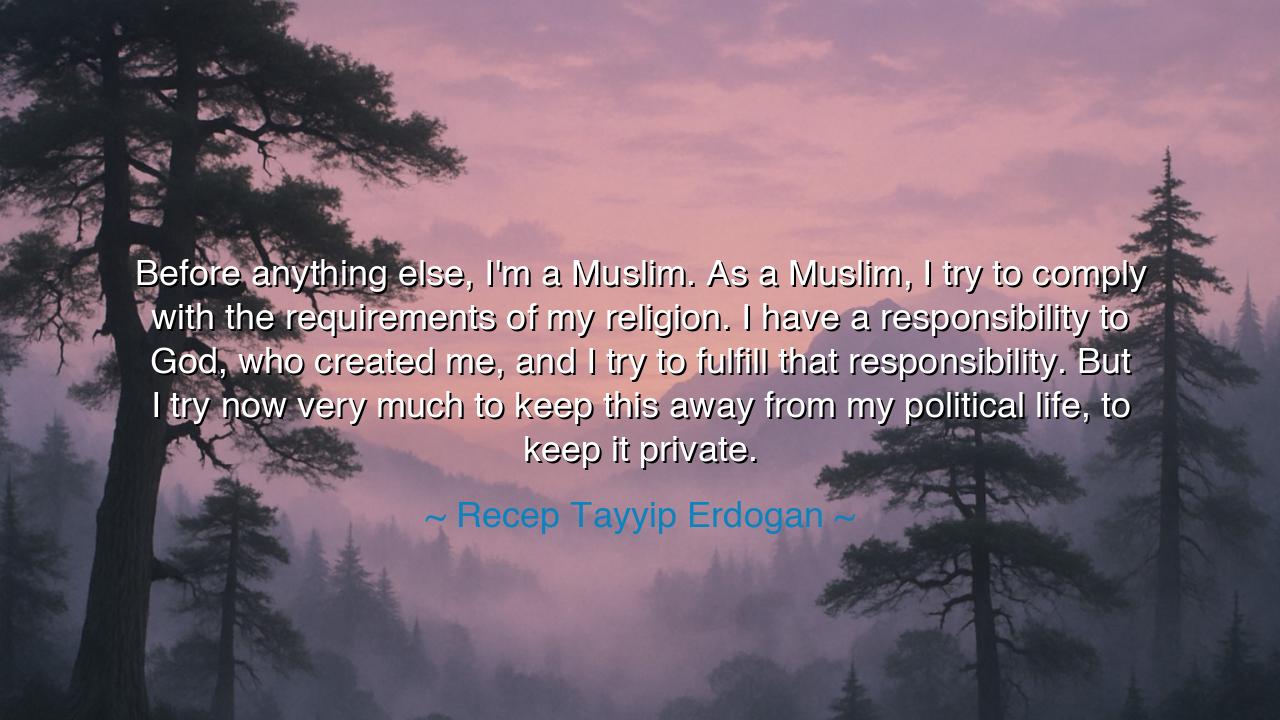
Before anything else, I'm a Muslim. As a Muslim, I try to comply
Before anything else, I'm a Muslim. As a Muslim, I try to comply with the requirements of my religion. I have a responsibility to God, who created me, and I try to fulfill that responsibility. But I try now very much to keep this away from my political life, to keep it private.






Hear now the solemn and weighty words of Recep Tayyip Erdoğan: “Before anything else, I’m a Muslim. As a Muslim, I try to comply with the requirements of my religion. I have a responsibility to God, who created me, and I try to fulfill that responsibility. But I try now very much to keep this away from my political life, to keep it private.” These words echo with the eternal struggle of mankind: the balance between private faith and public duty, between devotion to the Divine and service to the temporal order of men. For here is the truth of rulers and citizens alike—that the heart bows to heaven, even while the hands must labor upon earth.
The origin of this saying lies in the long history of the tension between religion and politics, a theme that has shaped empires, toppled kings, and raised reformers. Erdoğan, speaking from the seat of a modern leader, stands in a line of countless men who have wrestled with this division. To declare “Before anything else, I’m a Muslim” is to acknowledge faith as the root of identity, deeper even than nation or office. Yet to say also, “I try to keep this away from my political life”, is to recognize the peril when faith is wielded as a weapon in governance. Thus, his words are both confession and caution: confession of ultimate loyalty to God, and caution in mixing that loyalty with the storms of politics.
History gives us mirrors to understand this truth. Recall Marcus Aurelius, emperor of Rome, who though bound by duty to rule armies and provinces, was also a philosopher, turning inward to meditate on the eternal laws of nature and virtue. He wrote not of gods in temples, but of the inner duty to live rightly. Though his beliefs guided him, he seldom forced them upon the empire. In this balance of private devotion and public restraint, we hear an echo of Erdoğan’s words.
And yet, history also warns of the opposite. When rulers have allowed their religion to fully entwine with politics, blood has often followed. The Crusades were waged under banners of faith, kingdoms fractured under sectarian wars, and countless innocents perished because men confused the sword of governance with the cross or crescent of heaven. Erdoğan’s words, then, may be read as wisdom: the acknowledgment that while one must serve God with sincerity, governance demands restraint, lest faith become a cause of strife rather than unity.
But there is also in these words the humility of responsibility. “I have a responsibility to God, who created me.” This is no small thing. Every man and woman carries this same burden, though most forget it in the noise of daily life. To remember it is to walk with reverence, knowing that all deeds—public or private—are seen by an eye greater than the eye of men. A ruler who remembers this responsibility may be humbled, guided, and restrained by conscience, even when power tempts him to excess.
The lesson, O child of tomorrow, is this: know the difference between private faith and public duty. Hold fast to your responsibility to God, for it shapes your soul, but do not wield it as a tool to oppress or to divide. Let your religion guide your character, your honesty, your compassion, and your justice—but be careful when bringing it into the realm where many faiths and voices dwell. For the task of politics is to govern all, while the task of religion is to sanctify the individual before heaven.
Therefore, take action. In your own life, let your faith—whatever it may be—remain the compass of your heart. Let it shape you into one who is merciful, humble, and strong. But when you step into the world of others, into your work, your community, or your nation, do not wield your faith as a sword to silence, but as a light to inspire. In this way, you will honor both heaven and earth, both God and neighbor. And in this balance, you will walk the path of wisdom, proving that devotion and duty can coexist without destroying one another.






AAdministratorAdministrator
Welcome, honored guests. Please leave a comment, we will respond soon